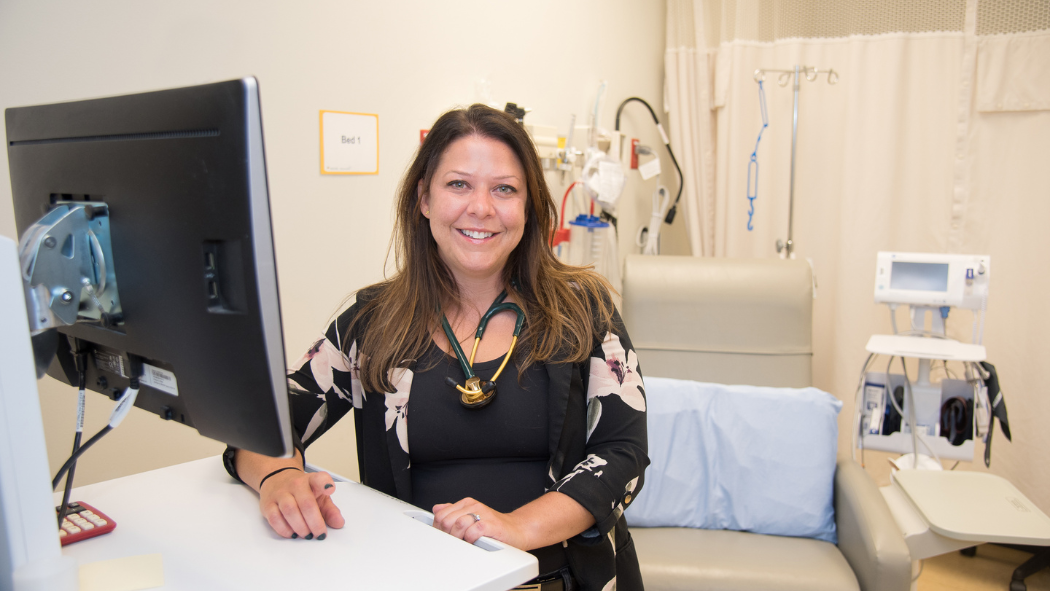
Photo: Deane Mulcahy, Nurse Practitioner, in the Systemic Therapy Assessment Clinic
August 12, 2025
“I was drawn to cancer care because I felt it was an area where I could truly make a difference. When I heard there were plans to develop a nurse practitioner-led clinic focused on symptom management for patients undergoing systemic therapy at the Verspeeten Family Cancer Centre, I was eager to be a part of it,” shares Deane Mulcahy, Nurse Practitioner, Cancer Care at the London Health Sciences Centre Verspeeten Family Cancer Centre.
Mulcahy’s path in nursing
Mulcahy began her nursing career in 2012 as a registered nurse (RN) spending six years on acute surgical units at Victoria Hosptial, LHSC. While completing her Master of Nursing and Primary Care Nurse Practitioner Program at Western University, she continued to gain experience in acute care, working in the emergency department. She graduated in 2019 and began working as a nurse practitioner later that year.
“After obtaining my NP designation, I provided care across the lifespan – from birth to end-of-life – managing both acute episodic conditions and complex, chronic diseases,” Mulcahy says
Working in the Systemic Therapy Assessment Clinic
The Systemic Therapy Assessment Clinic (STAC) is a nurse-practitioner led clinic that serves cancer patients undergoing systemic therapy treatment.
The clinic helps close a gap in service, so cancer patients receiving systemic therapy can be assessed for various symptoms and issues and treated appropriately outside of regular appointments with their physician. The hope is that this will help patients avoid the Emergency Department when appropriate. The clinic also plays an important role in minimizing disruptions to cancer treatment by addressing symptoms promptly.
Mulcahy was drawn to the position because of the rapid advancements in cancer care and the increasing complexity of patient needs during treatment. Explains Mulcahy. “I recognize that there can be limited understanding of oncology symptom management in primary care, so I wanted to bridge the gap and ultimately give patients an alternative to emergency care whenever possible.”
Her time on the team has been fulfilling both professionally and personally. “This has truly been the most rewarding role I’ve held as a nurse practitioner. Patients often share how much they appreciate having timely access to care.”
Being on a team that assesses symptoms, initiates appropriate investigations, provides timely treatment and tailors care to the patient’s specific treatment journey makes Mulcahy feel as if she and her team members are making a meaningful impact.
“There is a strong culture of collaboration and mutual respect, and everyone brings their unique expertise. Together, we’ve helped prevent unnecessary visits to the Emergency Department and facilitated timely hospital admissions when needed. Our proactive approach helps prevent delays or cancellations in systemic therapy by ensuring patients receive prompt assessment and management. This supports both better patient outcomes and continuity of care,” shares Mulcahy.
Mulcahy is proud to be a part of a model of care that prioritizes holistic, timely and compassionate care, positively impacting patients each day.
“I’m continually learning and growing in this role, and I value being part of a dedicated team working toward a shared goal: improving outcomes and supporting patients through some of their most vulnerable moments.”